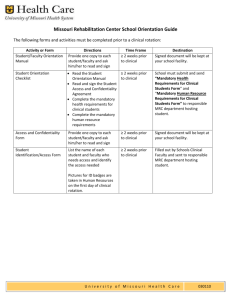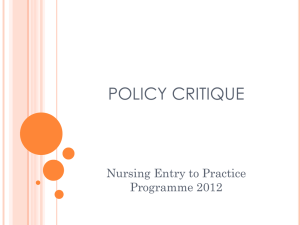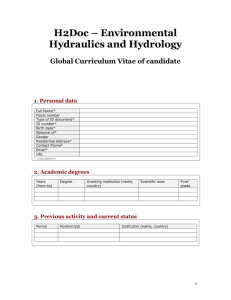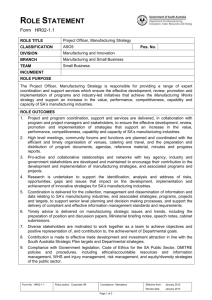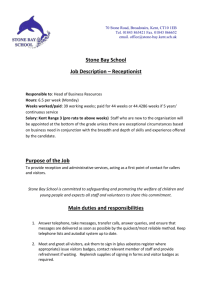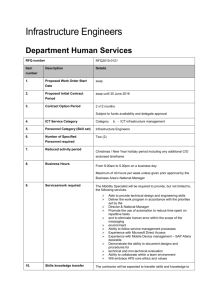report from south africa
advertisement
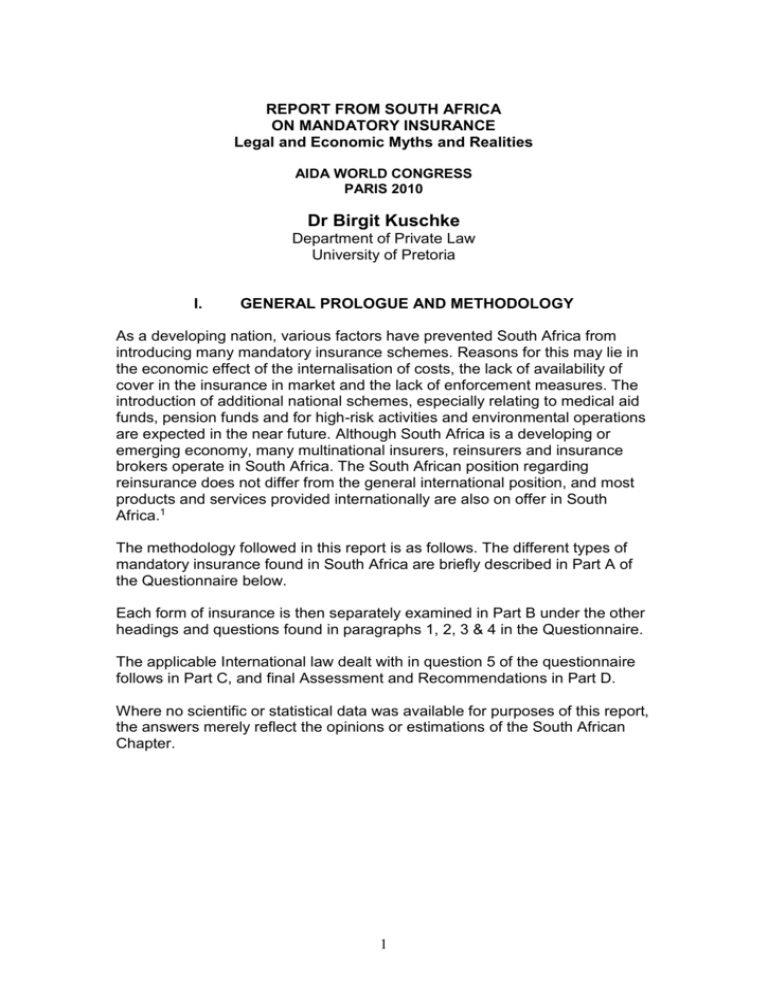
REPORT FROM SOUTH AFRICA ON MANDATORY INSURANCE Legal and Economic Myths and Realities AIDA WORLD CONGRESS PARIS 2010 Dr Birgit Kuschke Department of Private Law University of Pretoria I. GENERAL PROLOGUE AND METHODOLOGY As a developing nation, various factors have prevented South Africa from introducing many mandatory insurance schemes. Reasons for this may lie in the economic effect of the internalisation of costs, the lack of availability of cover in the insurance in market and the lack of enforcement measures. The introduction of additional national schemes, especially relating to medical aid funds, pension funds and for high-risk activities and environmental operations are expected in the near future. Although South Africa is a developing or emerging economy, many multinational insurers, reinsurers and insurance brokers operate in South Africa. The South African position regarding reinsurance does not differ from the general international position, and most products and services provided internationally are also on offer in South Africa.1 The methodology followed in this report is as follows. The different types of mandatory insurance found in South Africa are briefly described in Part A of the Questionnaire below. Each form of insurance is then separately examined in Part B under the other headings and questions found in paragraphs 1, 2, 3 & 4 in the Questionnaire. The applicable International law dealt with in question 5 of the questionnaire follows in Part C, and final Assessment and Recommendations in Part D. Where no scientific or statistical data was available for purposes of this report, the answers merely reflect the opinions or estimations of the South African Chapter. 1 II. QUESTIONNAIRE PART A (Questionnaire question1. Basic factors) 1.1 Cause of required mandatory insurance cover 1.1.1 By law 1.1.1.1 National law Statutes have been promulgated for purposes of introducing mandatory insurance within the following specific industries: (a) Relating specifically to operations and technologies that affect the environment, mandatory insurance is required within the nuclear industry, the oil and petroleum industries, for the liabilities of waste disposal contractors, operators of waste disposal facilities, transporters of waste, for underground or aboveground storage tanks. Most of these schemes are in accordance with international law as stated below.2 This will hereinafter be referred to as ‘environmental liability insurance’. (b) Professional bodies, such as the Health Professions Council of South Africa,3 and The Law Society of South Africa4 require their members to procure professional liability insurance cover before they may practice. For purposes of the rest of this questionnaire and this report this type of insurance is hereinafter referred to as ‘professional liability insurance’. (c) Insurance contributions must be made by employers for the benefit of their employees in terms of the Compensation for Occupational Injuries and Diseases Act 130 of 1993, and for unemployment in terms of the Unemployment insurance Act 30 of 1966 and Unemployment Insurance Contributions Act 4 of 2002. These types of insurance are hereinafter referred to a ‘workplace unemployment insurance’, and ‘workplace occupational injuries and diseases insurance’. Pension fund contributions are currently not mandatory. (d) Insurance must be procured for the carriage of persons or the transport of goods. Operators are required to procure insurance cover in terms of national and provincial legislation.5 This will hereinafter be referred to as ‘transport insurance’. (e) At the moment proposals serve before Parliamentary committees for the introduction of mandatory health care insurance, and a mandatory National Pension Fund. Both are in their initial phases and realistic expectations place their introduction beyond 2011. 2 1.1.1.2 International law South Africa has ratified, signed and acceded a multitude of international conventions and adheres to their provisions relating to mandatory insurance. 6 The provisions that apply in the nuclear and waste management industries serve as examples. References to the most important conventions and their current status in South African law, as well as their application can be found under Par C below. 1.1.2 By other co-contracting party Most forms of mandatory insurance are imposed by private agreements between persons who stand in a specific relationship. Examples include the following: 1.1.2.1 1.1.2.2 1.1.2.3 1.1.2.4 a consumer is required to obtain insurance cover, of asset insurance, to the benefit of his credit grantor (for example where life insurance on the life of a debtor is required by a his bank); a lessor of property requires a lessee to procure property or liability insurance; a client my require insurance as security from independent contractors such as designers, builders, engineers and so forth, to cover their liabilities towards their client in specific projects. Where a tour operator may require tourists to procure life and personal accident cover. Although insurance is not mandatory by operation of statute or regulation, the risk of incurring liabilities towards the state, for example for clean-up costs, and potential liability towards third parties force persons to obtain insurance cover. Facility pollution liability serves as an example. For purposes of the rest of this questionnaire and the report, insurance cover that is required by a co-contracting party, whether liability insurance, property insurance or first-party insurance to the benefit of a third party. For purposes of the rest of this report it is hereinafter referred to as ‘insurance procured due to agreement’. The detail regarding each of these forms of mandatory insurance follows under separate headings below. 3 PART B (Questionnaire questions 1 – 4) 1. Environmental liability insurance 1.1 Insurance is in accordance with international and national law. 1.2 Context: insurance was introduced without haste, after following proper consultation and promulgation processes.7 1.3 Nature of risk: primarily property (especially for natural resource damage) and liability insurance; in some cases also aspects of personal insurance such as personal injury and health. 1.4 Exclusions: no specific statutory exclusions exist. 1.5 Penalties: statutory penalties include criminal penalties and payment of fines. 1.6 Methods of taking out insurance: private; separate contract; no mandatory government scheme 1.7 Financial aspects: 1.7.1 Legally required minimum cover in some cases such as nuclear insurance. 1.7.2 No standard deductible. 1.7.3 Amount of premium fixed freely by insurers and insureds. 1.7.4 No bonus-malus system. 1.7.5 Due to the specialised nature of the insurance, lack of availability in the national market and the high risks, the insurance is expensive and is considered as such by insureds. 1.7.6 Premiums would be expected to be the same. 1.8 1.8.1 1.8.2 1.8.3 Financial data: Profit is generated by insurer. The risk is insurable even if it were not mandatory. It can be expected that fewer persons would take out insurance for environmental damage caused out of their own free will, if it was not mandatory. The opinion is that first-party property insurance, and some cover for liability insurance would be taken out by the prudent operator, yet little cover to remediate the environment would be obtained unless statutorily required. 1.9 Reinsurance Although South Africa is a developing or emerging economy, many multinational insurers and reinsurers operate in South Africa. Reinsurance is taken out with international reinsurers. Reinsurance is not mandatory. The attitude of the insurer is usually to reinsure nationally or internationally, depending on cover available. 4 2. Professional Liability insurance 2.1 Insurance is in accordance with international and national law. 8 2.2 Context: insurance was introduced without haste, after following proper consultation and promulgation processes. 2.3 Nature of risk: primarily liability insurance. 2.4 Exclusions: no statutory exclusions exist, except for professionals in service of the state. 2.5 Penalties: statutory penalties include criminal penalties, imprisonment and revocation or refusal to reissue license to practice. 2.6 Methods of taking out insurance: private; separate contract; mandatory schemes within the specific industry exist, for example the Attorney’s Fidelity Scheme, and the Medical Protection Society Ltd under the auspices of the South African Medical Association. 2.7 Financial aspects: 2.7.1 Legally required minimum cover in accordance with rules of industry. 2.7.2 Uncertain whether a general standard deductible exists. 2.7.3 Amount of premium fixed freely 2.7.4 In some cases a bonus-malus system applies. 2.7.5 Insurance is deemed to be expensive yet accepted as it is mandatory. 2.7.6 It is expected that the premiums would be the same. 2.8 Financial data: 2.8.1 Profit is generated by a private insurer and insurance scheme. 2.8.2 The risk is insurable even if it were not mandatory. 2.8.3 It can be expected that practitioners and professionals would take out liability and even property insurance if it was not mandatory. 2.9 Reinsurance Reinsurance by the specific schemes is taken out with national and international reinsurers. Reinsurance is not mandatory. The attitude of the insurer is usually to reinsure nationally or internationally, depending on cover available. 3. Workplace unemployment insurance 3.1 Insurance is in accordance with national statutory law. 9 3.2 Context: Insurance was introduced without haste, after following the proper consultation and promulgation processes. 3.3 Nature of risk: Risk covered is personal insurance, namely unemployment insurance. 5 3.4 Exclusions: Only applies to employers as defined as ‘employers’ in the Income Tax Act.10 The cover is not voluntary. 3.5 Penalties: for failure to provide or contribute to this insurance scheme include criminal penalties and/or imprisonment,11 as well as civil penalties and interest on late payments.12 3.6 Methods for taking out insurance: As it is a government scheme, registration is in terms of the rules of the scheme and no separate contract is required. 3.7 Financial aspects include the following: 3.7.1 Legally required minimum cover. 3.7.2 No deductible. 3.7.3 Amount of premium fixed by state; same amount for all policyholders, not fixed freely. 3.7.4 No bonus-malus system 3.7.5 Employees and employers generally consider the premiums acceptable as they are very low (a fixed percentage of the income of employee). 3.7.6 It can be assumed that the premium would be higher. 3.8 Financial data: 3.8.1 Not certain whether a profit or loss is generated. 3.8.2 The risk is insurable if it were not mandatory. 3.8.3 It can be expected that mostly persons in a higher income group would take out insurance if it was not mandatory. 3.9 Reinsurance It is uncertain whether this specific scheme is reinsured by the State with private reinsurers. 4. Workplace occupational injuries and diseases insurance 4.1 Insurance is in accordance with national statutory law. 13 4.2 Context: Insurance was introduced without haste, after following the proper consultation and promulgation processes. 4.3 Nature of risk: Risk covered is personal insurance, namely life, health, and accident insurance. 4.4 Exclusions: The Act excludes – (a) workers who are totally or partially disabled for less than 3 days; (b) domestic workers; (c) anyone receiving military training; (d) members of the South African National Defence Force, or the South African Police Service; (e) any worker guilty of willful misconduct, unless they are seriously disabled or killed; (f) anyone employed outside the RSA for 12 or more continuous months; and (g) workers working mainly outside the RSA and only temporarily employed in the RSA. 6 4.4 Penalties: for failure to provide or contribute to this insurance scheme, by paying the prescribed compensation fund assessment fees, include criminal penalties and/or imprisonment. 4.5 Methods for taking out insurance: As it is a government scheme, registration under the fixed rules of the scheme and no separate contract is required. 4.6 Financial aspects in include the following: 4.6.1 Legally required minimum cover 4.6.2 No deductible 4.6.3 Amount of premium fixed by state; same amount for all policyholders, not fixed freely 4.6.4 No bonus-malus system 4.6.5 Policyholders in general consider the premiums acceptable. 4.6.6 It can be assumed that the premium would be higher. 4.7 Financial data 4.7.1 Not certain whether a profit or loss is generated. 4.7.2 The risk is insurable if it were not mandatory. 4.7.3 It can be expected that mostly persons in a higher income group would take out insurance if it was not mandatory. 4.8 Reinsurance It is uncertain whether this specific scheme or fund is reinsured by the state. 5. Transport insurance 5.1 Insurance is in accordance with international (for transboundary carriage) and national law.14 In addition, extensive provincial15 and local government regulations also apply to the transport industry. 5.2 Context: insurance was introduced without haste, after following proper consultation and promulgation processes. 5.3 Nature of risk: primarily liability insurance, first-party insurance to the benefit of a third party for personal injury cover and first-party as well as first-party to the benefit of a third-party property insurance. 5.4 Exclusions: various exclusions exist on provincial and local government levels. 5.5 Penalties: statutory penalties include criminal penalties, imprisonment and revocation of operating license or the refusal to reissue license. 5.6 Methods of taking out insurance: private; separate contract; no mandatory government scheme. 5.7 Financial aspects: 7 5.7.1 5.7.2 5.7.3 5.7.4 5.7.5 Legally required minimum cover in some cases. No standard deductible Amount of premium fixed freely by insurers, and never by the state. Yes, bonus-malus system applies, yet is unregulated. Uncertain of the perceptions of the insureds regarding the premiums charged. 5.7.6 If insurance were not mandatory, the premiums would probably remain the same. 5.8 5.8.1 5.8.2 5.8.3 Financial data: Profit generated by insurer. The risk is insurable even if it were not mandatory. It can be expected that few persons would take out insurance fort environmental damage caused, if it was not mandatory. 5.9 Reinsurance Reinsurance taken out with international reinsurers is not mandatory. The attitude of the insurer is usually to reinsure nationally or internationally, depending on cover available. 6. Insurance procured due to agreement 6.1 No national statute regulates this type of insurance. 6.2 Context: insurance is introduced for various purposes, in some cases with and others without haste, depending on the circumstances. 6.3 Nature of risk: primarily first-party insurance such as property and personal insurance, liability insurance and even first-party insurance to the benefit of a third party. 6.4 Exclusions: no specific statutory exclusions exist. 6.5 Penalties: no statutory penalties exist. Penalties may exist due to the specific agreement between the parties. 6.6 Methods of taking out insurance: private; separate contract; no mandatory government scheme 6.7 Financial aspects: 6.7.1 Minimum cover may be required in terms of the agreement between the co-contracting parties. 6.7.2 Amount of premium fixed freely by insurer. 6.7.3 Bonus-malus system will depend on the insurer. 6.7.4 Various premium tariffs available in market and generally the insured may freely choose cover with a specific insurer. 6.7.5 Not applicable. 8 6.8 Financial data: 6.8.1 Profits generated by insurer. 6.8.2 The risk is insurable even if it were not mandatory due to agreement with co-contracting party. 6.8.3 It can be expected that fewer persons would take out insurance if it was not mandatory. 6.9 Reinsurance Reinsurance taken out with international reinsurers is not mandatory. The attitude of the insurer is usually to reinsure nationally or internationally, depending on cover available. PART C International Aspects (Questionnaire question 5) 5.1 Status of international law In terms of the Constitution of the Republic of South Africa 1996, international law has to be considered when enforcing the law.16 The status of in South African law of international treaties, conventions and agreements relating to industries in which mandatory insurance is or could be required, as introduced into our law via national legislation, is as follows.17 1. Agreement on the Privileges and Immunities of the IAEA18 2. Basel Convention on the Control of Transboundary Movements of Hazardous Wastes and their Disposal19 3. Convention on the International Regulations for Preventing Collisions at Sea20 4. Convention on Nuclear Safety (NS)21 5. Convention on Supplementary Compensation for Nuclear Damage (SUPP)22 6. Convention on the Physical Protection for Nuclear Material (CPPNM)23 7. Geneva Convention on Long-Range Transboundary Air Pollution24 8. International Convention for the Prevention of Pollution from Ships 1973 (MARPOL)25 9. International Convention on Civil Liability for Oil Pollution Damage (CLC Convention)26 10. International Convention on Load Lines27 11. International Convention on Salvage 198928 12. Joint Convention on the Safety of Spent Fuel Management and on the Safety of Radioactive Waste Management (RADW)29 13. Kyoto Protocol to the New York Convention of 1992 on Climate Change30 14. Montreal Protocol for the Protection of the Ozone Layer31 15. Paris Convention for the Prevention of Marine Pollution from Land Based Sources32 9 16. Persistent Organic Pollutants Convention (POP's)33 17. The Treaty on the Prohibition of the Emplacement of Nuclear Weapons and other Weapons of Mass Destruction on the Seabed and the Ocean Floor and the Subsoil thereof34 18. United Nations Convention to Combat Desertification in Countries Experiencing Droughts and/or Desertification, Particularly in Africa35 19. United Nations Convention on the Law of the Sea of 10 December 1982 (UNCLOS)36 20. United Nations Framework Convention on Climate Change (UNFCCC)37 21. Vienna Convention on Civil Liability for Nuclear Damage38 This list is not comprehensive for all treaties, and reflects only environmental instruments with specific focus on Climate Change. 5.2 Insurance is mandatory for nationals as well as foreign persons who participate within the specific industry in which the procurement of insurance is mandatory. Mandatory insurance is not required to be taken out locally. As stated above, even though South Africa is still a developing economy, many multinational insurers, reinsurers and insurance brokers operate in South Africa.39 5.3 It is not illegal to take out insurance with a foreign or ‘international’ insurer. The court would apply the law in accordance with the policy issued by the insurer to which the insured has agreed. The jurisdiction usually favours the insurer. Where the insurer is a national fund, the law of South Africa and South African jurisdiction will apply. 5.4 The position will depend on the specific agreement between the parties. 5.5 The same as above. PART D Assessment and Recommendations (Questionnaire question 6) 6.1 Prohibition of mandatory insurance 6.1.1 As a matter of principle, mandatory insurance should not, as a general rule, be prohibited. 6.1.1.1 Although it prohibits freedom to contract, the limitation of this freedom may be in the interests of society in general and limitation may be justified. The right to contract freely directly evolves from the right to dignity entrenched by s10 of the Constitution. 10 Constitutional rights maybe limited in terms of the operation of s36 of the Constitution.40 In addition to the general benefit of society, see also other advantages are discussed in par 6.1.1.2 below. 6.1.1.2 The lack of selection of the risk may also be justified by the following factors. The main advantages and benefits of implementing a mandatory or compulsory insurance scheme include the increased expected utility of the responsible parties. The danger, however, exists that the risk premium can be higher than the objective value of the risk. Mandatory insurance also contributes to economic efficiency in that the policyholder receives compensation to cover his losses from the insurer, who has to exercise control over and monitor the behaviour of his policyholder. Where the insurer compensates losses at certain specified contingencies, as is the case in mandatory industrial accident insurance, is equivalent to a guarantee and has the advantage that it provides greater financial security. Mandatory cover can also provide a solution for the prejudiced party where the insured has a problem of liquidity, for example in the event of the policyholder’s insolvency.41 6.1.1.3 As the South African position is that mandatory insurance beyond the scope of government or specified industry funds42 does not require insureds to obtain cover from specified insurers, and therefore has little impact on competition between insurers. Availability and affordability of insurance within the market determines from which insurer the cover will be obtained. 6.1.2 In terms of the Constitution persons have a freedom to trade, and forcing an insurer to provide specific insurance cover could infringe upon this specific constitutional right.43 It is uncertain whether reinsurers are reluctant to reinsure in this situation. 6.2 Due to the advantages that this type of insurance offers, general opinion is that mandatory insurance should not be repealed. The following may, however, be seen as disadvantages of mandatory insurance and could serve as an argument to support the repeal of mandatory insurance schemes: The potential disadvantages or dangers of mandatory insurance include (a) that it can cause a concentration in and inflated dependence upon insurance markets; (b) another side-effect is the danger of increasing over-insurance caused by the lack of information on development risks and unpredictable hazards; (c) the necessity of increased co-operation with insurers and its effect on the market; (d) the imposition of a duty on insurers to accept their duties to provide cover in terms of the mandatory coverage required, where the market is unable to actually cover these risks. In practice it appears to be unsuitable as insurers are clearly reluctant to provide cover; (e) the management of such a scheme remains a costly exercise. A possible solution would be to place mandatory financial caps on the cover provided by mandatory insurance products.44 11 Opinion is divided on whether the advantages and benefits offered by mandatory insurance outweigh its disadvantages. Mandatory insurance has the potential of providing a solution to insurance claims issues, but that it can only be effective where the operators who are required to obtain the cover actually do so. It is here where the capacity to enforce statutory measures becomes problematic in South Africa. Government funds are focused on development and not necessarily on enforcement. Enforcement is simplified in cases where statutes provide for the possibility of revoking or refusing to reissue operating licenses to ensure compliance. 6.3 Mandatory insurance should be confined to huge risks that affect society in general. It is supported that the following specific risks listed in par 6.3 of the questionnaire justify mandatory insurance: civil liability risks as discussed in Part B above; property damage in the event of natural or catastrophic disasters; personal injury for the risks suffered by persons who are specifically vulnerable and exposed; dependency insurance; health and retirement insurance. 6.4 South Africa is in urgent need of mandatory insurance for environmental clean-up and restoration, as well as for harm caused to third parties via damage done to the environment. This should be introduced on a national and international level where there is a risk of transboundary pollution. Support exists for the introduction of mandatory first-party insurance for the benefit of a third party for environmental damage caused in specific risk situations.45 The introduction of mandatory health care insurance and pension fund benefits can also be supported.46 See again the advantages and benefits listed under 6.1.1.2 above. Attempts must be made to facilitate mutualisation for the premium and market capacity benefits that it offers. It will enforce compliance. 6.5. Rigid enforcement of taking out a specific prescribed insurance contract should be avoided as it places severe restraints on insureds and would affect competition. 6.5.1 As is the case in most mandatory schemes referred to in this report under Part B, the nature, scope and value of cover should be prescribed. Inclusion in an existing insurance contract, or the development of group insurance contracts, may prove to be beneficial in certain circumstances where the risk can be shared within a specific industry, or where there is multiple or collateral causation.47 The absolute obligation of an insurer to provide insurance cover cannot be supported in view of the factors mentioned in par 6.1.2 above. 6.5.2 It is preferable that premiums should, for control and protection purposes, be fixed by law. 6.5.3 The bonus malus system should apply as a deterrent and to ensure increased expected utility of the responsible parties. 6.5.4 The limit of cover should preferably be subject to a prescribed minimum. 12 6.5.5 For control purposes, clauses describing the risks and specific exclusions should be prescribed and their inclusion and scope regulated. 6.5.6 As is the case with forcing insurers to insure as stated in par 6.1.2 and 6.5.1 above, the obligations provide insurance should not be imposed upon reinsurers either. 6.5.7 Where insurance or reinsurance is not available, the state should act as a last-layer insurer, or 6.5.8 by the support of a back-up fund set up either by the government or another authority. This will provide additional security to prejudiced parties. Brice J “Are you covered?” Institute of Risk Management South Africa; Enterprise risk July 2007 14; where cover cannot be obtained within South Africa, cover may be obtained offshore; see also at 14 for data from Swiss Re that indicates that only 0.1% of the world’s insurance premiums originate from Africa. 2 See par 1.1.1.2 below. 3 See http://hpcsa.co.za. 4 See http://www.lssa.org.za. 5 National Land Transport Act 5 of 2009, specifically sections s61(2); s69; s72; S81(bb); the mandatory insurance to be taken out in terms of this statute is in addition to the cover provided for road accidents in terms of the Road Accident Fund Act 56 of 1996. No premiums are levied for purposes of this fund. A petroleum levy funds the RAF, and claims are managed by the State. 6 See par 1.1.1.2 below. 7 The issue is managed by the Department of Environmental Affairs and Tourism of the government of South Africa. 8 The specific statutes (for examples the Attorneys Act 53 of 1979; the Medical, Dental and Supplementary Health Services Professions Act 56 of 1974), and the rules and regulations issued within specific industries such as the attorneys profession (by the Law Society of South Africa) and the medical professions (The Health Professions Council of South Africa) 9 Unemployment Insurance Contributions Act 4 of 2002. 10 Act 58 of 1962. 11 Unemployment Insurance Contributions Act 4 of 2002 s17. 12 Above s13. 13 Compensation for Occupational Injuries and Diseases Act 130 of 1993 s 30. 14 For personal injury and liability cover, see the National Land Transport Act 5 of 2009, specifically sections s61(2); s69; s72; s81(bb); the mandatory insurance to be taken out in terms of this statute is in addition to the cover provided for road accidents in terms of the Road Accident Fund Act 56 of 1996. 15 Note that South Africa has 9 provinces each with their own legislative powers and authority. A comprehensive list is therefore extensive and only the national position is dealt with for purposes of this report. 16 As enforced by s39(1)(b); see also s108(2), s231, s232, s233 of the Constitution. 17 For a comprehensive list see http://www.dfa.gov.za/foreign/Multilateral/inter/index. 18 Signed as a party with reservation on 13 September 2002. 19 Approved on 27 March 1994 and acceded on 5 April 1994. Even though a draft policy for Hazardous Waste Management has been published in GN 1064 Government Gazette No 15987 dated 30 September 1994, and Proposed Regulations drafted (undated), no final regulations have been made in line with the model regulations proposed by the Basel Convention. 1 13 20 Signed 30 December 1976 and acceded 15 July 1977. Ratified on 24 December 1996. 22 Currently a convention under negotiation. 23 Party with reservation signed on 18 May 1981. 24 Signed on 13 November 1979. 25 Agreed to as amended in 1978. 26 Adopted in 1969 and amended in 2003. 27 Signed 14 December 1966 and acceded 21 July 1968. 28 Agreed to in terms of the Wreck and Salvage Act 94 of 1996. 29 Acceded to on 15 November 2006. 30 Acceded to in July 2002. 31 Ratified and acceded to on 15 January 1990. 32 Acceded to on 4 June 1974. 33 Currently a convention under negotiation. 34 Ratified 14 November 1973. 35 Signed on 9 January 1995 and ratified on 30 September 1997. 36 Signed in 1994 and ratified on 20 August 1997. 37 Signed on 27 August 1997, and ratified on 29 August 1997. 38 Currently a convention under negotiation. 39 Brice J “Are you covered?” Institute of Risk Management South Africa; Enterprise risk July 2007 14; where cover cannot be obtained within South Africa, cover may be obtained offshore; see also at 14 for data from Swiss Re that indicates that only 0.1% of the world’s insurance premiums originate from Africa. 40 Section 36 states that ‘(1) The rights in the Bill of Rights may be limited only in terms of law of general application to the extent that the limitation is reasonable and justifiable in an open and democratic society based on human dignity, equality and freedom, taking into account all relevant factors, including – (a) the nature of the right; (b) the importance and purpose of the limitation; (c) the nature and the extent of the limitation; (d) the relation between the limitation and its purpose; and (e) less restrictive means to achieve the purpose. (2) Except as provided under subsection (1) or in any other provision of the Constitution, no law may limit any right entrenched in the Bill of Rights.’ 41 See in general for the advantages and disadvantages of mandatory insurance cover in an environmental context Kuschke B insurance against Damage caused by Pollution LLD thesis (University of South Africa) 2009 chap 5. 42 See for example the insurance that is procured from the Medical Protection Society Ltd under the auspices of the South African Medical Association for medical practitioners liability cover. 43 See s 22, as well as n 40 above on the limitation of a constitutional right in terms of s 36 of the Constitution. 44 Again, see Kuschke n41 par 5.5.2. 45 See above Kuschke chap 5.5.4. 46 See in this regard Board of Healthcare Funders “Healthcare Reform: healthcare” 2007 (1) August Blue chip 28; McIntyre D, Van den Heever A, in Borghi J et al (2009) CHERNICHOVSKY, D. & HANSON, K. (Eds.) Advances in Health Economics and Health Services Research chap 5 “Methodological challenges in evaluating health care financing equity in data-poor contexts: Lessons from Ghana, South Africa and Tanzania”; on pension funds see Cranston S “Buy in or opt-out? Retirement fund reform: money and investing” 2007 June 8 Financial mail 46. 47 See in general Kuschke chap 7.4. 21 14
